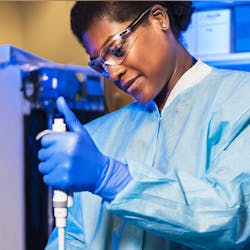The Association for Molecular Pathology (AMP) released the preliminary results of its April 2020 SARS-CoV-2 Testing Survey for clinical laboratories. The anonymous survey was created and administered to document clinical laboratory efforts and experiences. The results will be used to help inform future advocacy and clinical practice programs related to pandemic responses.
AMP’s 67-question survey assessed many important aspects of SARS-CoV-2 molecular diagnostic testing, including methodology, performance, capacity, supply chain, regulatory, and reporting requirements. The preliminary results included feedback from 118 representatives from U.S.-based academic medical centers, commercial reference laboratories and community hospitals. Eighty-five percent of these respondents are currently offering SARS-CoV-2 testing to patients, while another 10 percent are currently in the test validation phase.
Ninety percent of the laboratories recognize the need to increase diagnostic testing capacity further, and they are working hard to make this happen in the next few months. However, more than 70 percent of these laboratories have experienced supply chain interruptions that have resulted in significant delays, in many cases forcing them to validate at least three different diagnostic testing methods at the same time just in case the supply of reagents or materials runs out. These supply shortages have included everything from the RNA extraction kits, primers, probes, and enzymes to the physical sample collection materials, such as the swabs and containers for storage and transportation.
Based on the common themes found in the survey results, AMP is recommending that federal, state and local governments:
· Reassess type and location of SARS-CoV-2 testing services needed: In order to provide acute care, safely reopen businesses and reinvigorate the economy, there should be a reassessment of what type of testing is needed and where.
· Reprioritize supply allocations based on clinical testing needs, which could change over time: Depending upon the prevalence of SARS-CoV-2 in a community, there may be a shift in testing methodology and related supply needs over time. The need for testing supplies designed for acute care, surveillance, high-throughput, and other clinical needs should be monitored widely to provide real-time feedback to agencies to support data-driven supply allocations.
· Increase transparency, communication, and real-time transmission of Information between laboratories and suppliers (commercial manufacturers and government): There is a need for laboratories to understand in real-time resource availability and reagent and supply quantities.
· Real-time coordination amongst laboratories to leverage moments of excess capacity: Based on data regarding testing capacity and demand, there may be an opportunity to coordinate regionally to ensure that any excess test capacity is leveraged to ensure samples get processed as quickly as possible.
· Standardize agency reporting format and processes for reportable infectious diseases during a pandemic: Complying with multiple agency-reporting requirements with variable formats has been burdensome to the clinical laboratories.
AMP will continue to review and analyze the results of the survey as part of its ongoing commitment to share expertise, assess laboratory needs, engage key stakeholders and provide recommendations for improving future pandemic responses and ensuring more patients have access to high-quality testing procedures. The AMP report can be found at https://www.amp.org/AMP/assets/AMP_SARS-CoV-2_Survey_Report_FINAL.pdf?pass=52.
AMP will present the preliminary results of the APRIL 2020 SARS-CoV-2 Testing Survey during a webinar on Thursday, June 11, 2020, at 1:00 pm EDT. Karen E. Weck, MD, current AMP President and Professor of Pathology and Laboratory Medicine, Professor of Genetics and Director of Molecular Genetics and Pharmacogenomics at University of North Carolina Chapel Hill, will be joined by Karen L. Kaul, MD, PhD, Former AMP President and Chairman of Department of Pathology at NorthShore Research Institute, Frederick S. Nolte, PhD, Chair of AMP Infectious Diseases Subdivision and Director of Clinical Laboratories at Medical University of South Carolina, and Jordan Laser, MD, Chair of AMP Professional Relations Committee and Medical Director of Long Island Jewish Medical Center – Pathology and Laboratory Medicine.

